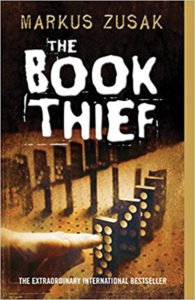
Author: Markus Zusak
First Published in 2005
Publisher: Picador
Pages: 584
Illustrator: Trudy White
Genre: Novel-Historical Fiction
To live in a state of conflict or to be the subject of war zone is a privilege in its own sense. On the one hand, situations of conflict inflict some psychological damage on their subjects, especially children living under conflict or in a war zone.On the other, it enables such subjects to see the world from a different viewpoint other than the spectacle of ‘normalcy’, making them learn and master the art of survival and sustainability in a space that is not fit for everyday life.
The Book Thief, the novel under review depicts such a world afflicted by war and conflict and narrates the story of a girl, Liesel Meminger, who learns to sustain her humanity in Hitler’s Nazi Germany, during World War II. The novel is written by the Australian novelist Markus Zusak and published in 2005, quickly becoming an international bestseller. The narrator of the story is death itself as it engages with and reflects upon life at a time of war. Liesel, the protagonist, whose parents are taken away by Nazis for their political beliefs, is left to be raised by her foster parents, Hans Huberman and Rosa Huberman, in a township in Southern Germany. She loses her younger brother to death just before her mother leaves her with her new foster parents, the Hubermans.
Also Read: THE MOTORCYCLE DIARIES
The two Hubermans, Hans and Rosa, are diametrically opposite characters. Hans is a compassionate father who teaches Liesel to read and write, while Rosa is outwardly a stiff lady who calls her husband and adopted daughter as ‘filthy pigs’.However, time proves her to be a good caring woman made for crisis management. Liesel is surrounded by some more characters like Rudy Steiner, the next door boy who is a Jesse Owens fan. Rudy becomes Liesel’s best friend. Max Vandenburg, the Jewish boxer, who takes refuge in the house of the Hubermans to escape the Nazi terror, befriends Liesel because of their shared affinity for words.
Max presents her a plain painted copy of Mein Kampf, Adolf Hitler’s autobiographical book. Through Max, Liesel develops as a good reader and writer, which finally saves her from the psychological epidemic and trauma spread through wars and conflicts. As the story unfolds, Liesel learns to cope with her loses but more importantly she develops into a thief, a passionate book thief. For her, there are no good books or bad books, just books, and she loves to read every book in whatever situations, whether in her home or atthe community bomb shelter. This reading helps her to converse with the living and the dead and finally it is these stories that prove to be her way towards salvation. The story contains many symbolic messages on morality, on the art of reading and writing, on the beauty of languages, and on love and compassion, etc.
The novel received international recognition, winning various awards like the 2006 Commonwealth Writer’s Prize for best book (South East Asia and South Pacific) and many more. The film adaptation of the novel was released in 2013 by the same title.
Advertisement


